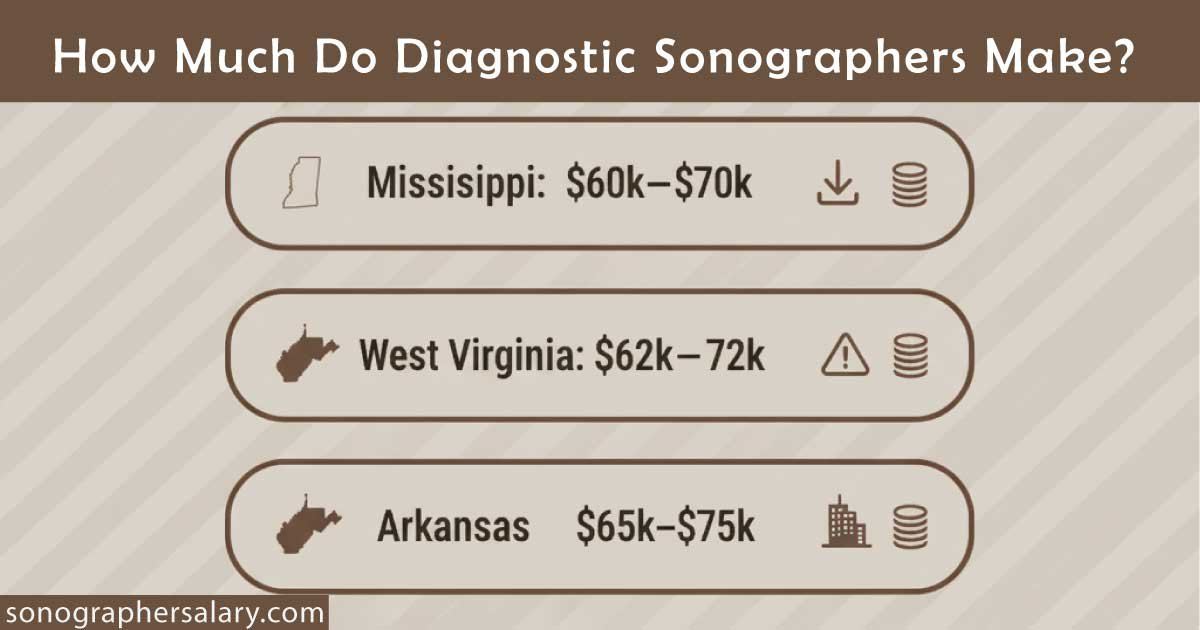Diagnostic Medical Sonographer Salary is one of the most significant considerations that one should make in case one is contemplating a career in this area. With the increasing demand of medical imaging specialists, the scale of diagnostic sonography salaries per state and different pay scale is becoming more competitive. Using Diagnostic Medical Sonography as an example, the pay scale of this occupation greatly depends on the location, experience and specialization. The average wage of the diagnostic medical sonographer is between 60,000 and 90,000 or even more annually, however, the location and certifications may drive it up.
The given guide will examine the diagnostic sonographer salary per month, diagnostic sonographer salary per hour, and how this income varies according to the state, with a particular focus on the most well-paying regions such as Diagnostic sonographer salary Texas. Whether diagnostic sonography is a good career, the possibility of getting career advancement and job stability will also be discussed. We will also respond to such questions as do sonographers make more than RN? and offer suggestions on how you can maximize your income as a diagnostic medical sonographer.
What Is Diagnostic Medical Sonographer Salary?
It is normally believed that the average salary of the diagnostic medical sonographer is normally between 60, 000 and 90,000 usd per annum depending on factors like experience, location and specialization. In certain areas the salaries can be higher than this spectrum particularly in high demands areas. The salary per month of the diagnostic sonographer and the salary per hour of the diagnostic sonographer are also subject to change, with the sonographers with low experience making less and those with advanced credentials or with specialty certifications making more. Such factors as certifications and geographic location, as the diagnostic sonographer salary Texas, could greatly determine earnings.
What Is a Diagnostic Medical Sonographer?
A diagnostic medical sonographer is a medical worker who utilizes the ultrasound image technology in helping the doctors to diagnose and treat medical conditions. These professionals work in hospitals, clinics, and diagnostic imaging centers and they focus on different areas of specialization and they include abdominal, cardiovascular and obstetric sonography.
Average Salary of a Diagnostic Medical Sonographer
According to U.S. Bureau of Labor Statistics (BLS) median annual wages of diagnostic medical sonographers in 2023 was about 80,000 usd / per annum. This implies that half of the total sonographers make over this figure and the rest make less. Nevertheless, pay may differ greatly depending on some aspects, such as experience, place and expertise.
Diagnostic Medical Sonographer Salary by Experience Level
| Experience Level | Salary Range |
|---|---|
| Entry-Level (0-2 Years) | $55,000 – $65,000 |
| Mid-Career (3-5 Years) | $70,000 – $85,000 |
| Experienced (6-10 Years) | $85,000 – $100,000 |
| Senior-Level (10+ Years) | $100,000+ |
Experience plays a huge role in salary potential. As sonographers gain more expertise and certifications, they can negotiate higher pay.
Diagnostic Medical Sonographer Salary by Work Setting
| Work Setting | Salary Range |
| Hospitals | $75,000 – $85,000 |
| Outpatient Care Centers | $85,000 – $95,000 |
| Diagnostic Laboratories | $70,000 – $80,000 |
| Physician Offices | $65,000 – $75,000 |
Outpatient care facilities have higher salaries as they require sonographers to work under a specialized setting and might have a larger number of patients.
Diagnostic Medical Sonographer Salary by Location
The salaries of diagnostic medical sonographers may have a wide variation depending on the geographic location. Those states that are in high demand and have a higher cost of living have a tendency of paying more.
Top-Paying States for Sonographers:
| State | Salary Range |
| California | $100,000+ |
| Hawaii | $95,000 – $105,000 |
| Alaska | $90,000 – $100,000 |
| Washington D.C. | $88,000 – $98,000 |
| Oregon | $85,000 – $95,000 |
Lowest-Paying States for Sonographers:
| State | Salary Range |
| Mississippi | $60,000 – $70,000 |
| West Virginia | $62,000 – $72,000 |
| Arkansas | $65,000 – $75,000 |
| Alabama | $65,000 – $75,000 |
| South Dakota | $66,000 – $76,000 |
If you are willing to relocate, move to a high-paying state can significantly increase your salary.
Diagnostic Medical Sonographer Salary by Specialization
| Specialization | Salary Range |
| Cardiac Sonographer (Echocardiography) | $85,000 – $100,000 |
| Vascular Sonographer | $80,000 – $95,000 |
| Obstetric and Gynecologic Sonographer | $75,000 – $90,000 |
| Abdominal Sonographer | $70,000 – $85,000 |
| Musculoskeletal Sonographer | $85,000 – $100,000 |
High-demand specialization can be improved by cardiac/musculoskeletal sonography to increase earning capability.
Job Outlook for Diagnostic Medical Sonographers
The diagnostic medical sonographers have a very promising job outlook. The BLS expects employment to increase by 10 percent between 2022 and 2032 which is higher than the average rate of all occupations. The reasons behind this demand are:
An aging population requiring more medical imaging
Advancements in ultrasound technology
A shift towards non-invasive diagnostic procedures
With growing demand, salaries are also expected to rise over the next decade.
1. Growing Demand for Diagnostic Medical Sonographers in Healthcare
The demand of diagnostic medical sonographers is growing rapidly because of the development of medical imaging and non-invasive diagnostic methods. As the population is getting older, the demand of ultrasound professionals in healthcare has increased. Basic health facilities such as hospitals, clinics and imaging facilities are also increasing and providing sufficient employment openings. The Bureau of Labor Statistics forecasts the gradual growth of employment.
2. Salary Expectations for Diagnostic Medical Sonographers in 2025
Diagnostic medical sonographers have been experiencing increment in salaries, and this has been due to higher demand of skilled persons. The aspects that make earnings are experience, location and specialization. The income level can be raised by means of payments in cities and other qualifications. The salaries in this profession are competitive and this is an attractive profession given the fact that most of the professionals are secure in the financial sphere and stable in the health care sector.
3. Educational Requirements for Becoming a Diagnostic Medical Sonographer
To become a diagnostic medical sonographer, individuals typically have to have associate degree or special certificate in sonography. Accreditation programs provide practical training and classroom instruction on anatomy, physiology and imaging modalities. Such organizations as ARDMS annex certification by most employers. There is need to engage in constant learning to be familiar with the technological shifts in ultrasound imaging.
4. Work Environment and Career Growth for Diagnostic Medical Sonographers
Diagnostic medical sonographers work in hospitals, in private clinics and imaging centers and typically have physicians and radiologists as their partners. Preparation of patients, working with ultrasound machines, and image analysis are also part of their responsibilities.
The possibilities of career development include such specialties like vascular or cardiac sonography. They have some professionals who become leaders, instructors or researchers in the medical imaging profession.
How to Increase Your Salary as a Diagnostic Medical Sonographer
To boost your income potential in this industry, explore these effective approaches:
Conclusion: Is Diagnostic Medical Sonography a High-Paying Career?
The profession of a diagnostic medical sonographer is a good career option, both in terms of finances and profession. This is a perfect career in which one should work in the medical field, because of the attractive remuneration, good job growth, and a lot of opportunities of advancing to a higher job. You can start with an entry-level sonographer salary in Texas and increase your income as time passes with many choices to take.
Diagnostic medical sonographers may get varying salaries, yet earning power of specialization and geographic freedom is high. The average salary of diagnostic medical sonography is usually between 60,000 and 90,000 per year, which means that there is a lot of chance to achieve success in terms of finances. The most effective way to increase your salary is to achieve more certifications and specializations, or migration to high-paying states according to the high-paying states of diagnostic medical sonographer salary.
Should you be planning to become this career, keep in mind that formal education, experience and certification can have a great influence on your diagnostic medical sonographer pay. The profession is both a secure and well paying career and with awareness of the trends of salary and exploiting your potentials, you will be in a position to enjoy your job.
👉 Want to know the real Breast Sonographer Salary and how much specialists actually earn? This post breaks down pay scales, demand, and career growth in a clear, motivating way. Read the full article to see why this specialty offers strong income and stability!

Zak is a dedicated medical and career writer specializing in sonography, healthcare education, and professional development. Through SonographerSalary.com, he shares in-depth insights on sonographer salaries, education pathways, and career tips to help readers build successful futures in medical imaging. His content combines accuracy with practical, easy-to-understand guidance, empowering students and professionals to make confident, informed career decisions.

